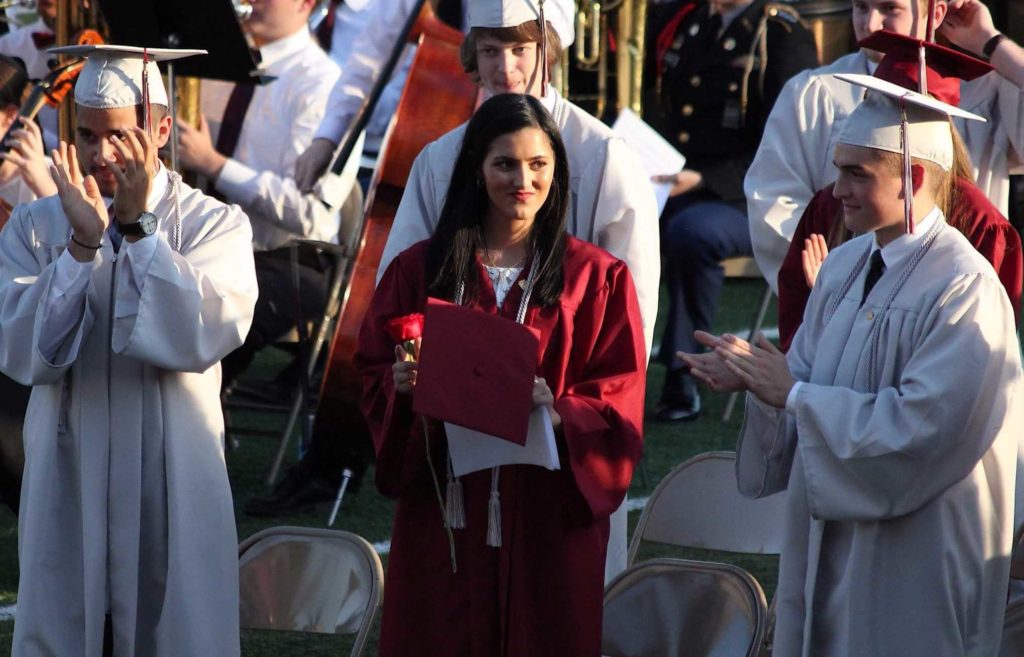School District Revises Policy After Student Told to Remove Prayer From Graduation Speech

BEAVER, Pa. — A school district in Pennsylvania has revised its policy regarding graduation speeches after a student was told earlier this year that she had to remove a prayer from her speech because its inclusion would be illegal.
The Beaver Area School District recently sent a letter to Moriah Bridges to apologize that she had not been allowed to include the prayer, and to note that students will have the freedom to include religious thought in their speeches in the future.
“Under the revised policy, student speakers will be selected on the basis of genuinely neutral, objective criteria, and will retain primary control over the content of their expression. The expressions of student speakers will not be attributable to the district and will not be restricted because of religious, anti-religious or non-religious content,” the letter, signed by Superintendent Carrie Rowe, read.
According to the First Liberty Institute, which represented Bridges, the senior class president had asked Bridges to give the “closing exercise” for the June 2 graduation. As Bridges identifies as a Christian, she wanted her words to reflect her faith, and included a prayer for her classmates that read in part, “Lord, surround us everywhere we go.”
“I just wanted to share all of my hopes, calling upon my Christian identity at graduation,” she told local television station WTAE.
However, after submitting her speech for review, Bridges received notice from Rowe that she would need to revise the text as the inclusion of a prayer could be considered unconstitutional.
“[T]his is not permissible by federal law as prayer (even student-initiated prayer) has been held to be unconstitutional by the Supreme Court as a violation of the Establishment Clause,” Rowe wrote.
“The selected students may still address their class and indicate the things that they wish/hope for their class,” she continued, “but they may not do it in the style of a prayer and most certainly may not recite a prayer that excludes other religions (by ending ‘in the name of our Lord and Savior, Jesus Christ’ or ‘in the matchless name of Jesus.’)”
Bridges consequently revised her speech, and the text was approved. When taking the podium, however, she boldly spoke the name of Jesus, noting to those listening that she had been told she could not.
“I’ve always been a rule follower,” Bridges said. “When they said not to chew gum, I didn’t chew gum. When they said not to use your cell phone, I didn’t use my cell phone.”
“But today, in the spirit of defying expectations, and for perhaps the last time at this podium, I say, ‘in the matchless name of Jesus Christ. Amen,’” she concluded, evoking cheers and applause from the audience.
Bridges also retained assistance from the First Liberty Institute, which sent a letter to Rowe and others to advise that the determination that religion needed to be scrubbed from the ceremony was improper.
“The issue of student remarks at high school graduations that happen to contain religious references is far from novel. Under most circumstances, such as here, a graduation speaker’s words are her own, not the government’s,” the correspondence read. “A student’s remarks are not attributable to the state simply because they are delivered in a public setting or to a public audience.”
“Moriah’s words constituted her private speech, not government speech; private speech is not subject to the Establishment Clause,” it continued. “… Clearly, there were no Establishment Clause concerns raised by Moriah’s speech. But even if there were, the desire to avoid a perceived Establishment Clause violation is not a valid reason to violate the Free Exercise Clause by engaging in censorship.”
In September, Bridges and a representative from First Liberty Institute met with Rowe, and on Nov. 20, the Beaver Area School Board voted to revise its graduation policy to ensure that students like Bridges had the right to express religious thought in their speeches. The following day, Rowe sent Bridges a letter to notify her of the development.
“I am sorry there was a lack of clarity about our policy, and I regret the frustration this caused you and your family,” the correspondence stated. “… Since becoming superintendent last year, I’ve been reviewing all district policies, and I wish I had gotten to this one sooner.”
The First Liberty Institute applauded the move by the district in issuing a statement on Thursday.
“Students retain their constitutional rights to freedom of expression from the schoolhouse gates, all the way through the graduation ceremony,” said Deputy General Counsel Jeremy Dys. “By adopting this new policy, the BASD is taking the important step of protecting future students who wish to reference their religious beliefs in a personal speech to their classmates.”





Comments are closed.